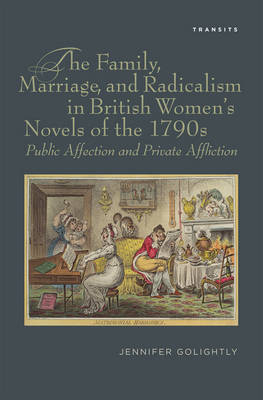
The Family, Marriage, and Radicalism in British Women's Novels of the 1790s
Public Affection and Private Affliction
Seiten
2011
Bucknell University Press (Verlag)
978-1-61148-360-4 (ISBN)
Bucknell University Press (Verlag)
978-1-61148-360-4 (ISBN)
This book explores the ways in which five female radical novelists of the 1790s—Elizabeth Inchbald, Eliza Fenwick, Mary Hays, Charlotte Smith, and Mary Wollstonecraft—attempted to use the components of private life to work toward widespread social reform. These writers depict the conjugal family as the site for a potential reformation of the prejudices and flaws of the biological family. The biological family in the radical novels of female writers is fraught with problems: greed and selfishness pervert the relationships between siblings, and neglect and ignorance characterize the parenting received by the heroines. Additionally, the radical novelists, responding to representations of biological families as inherently restrictive for unmarried women, develop the notion of marriage to a certain type of man as a social duty. Marriage between two properly sensible people who have both cultivated their reason and understanding and who can live together as equals, sharing domestic responsibilities, is shown to be an ideal with the power to create social change. Positioning their depictions of marriage in opposition to earlier feminist depictions of female utopian societies, the female radical novelists of the 1790s strive to depict relationships between men and women that are characterized by cooperation, individual autonomy, and equality.
What is most important about these depictions is their ultimate failure. Most of the female radical novelists find such marriages nearly impossible to conceptualize. Marriage, for many of the female radical novelists, was an institution they perceived as inextricably related to (male) concerns about property and inescapably patriarchal under the marriage laws of late eighteenth-century British society. Unions between two worthy individuals outside the boundaries of marriage are shown in the female radical novels to be equally problematic: sex inevitably is the basis for such unions, yet sex leaves women vulnerable to exploitation by men. Rather than the triumph, therefore, of what comes to be in these novels the male-associated values of property and power through marriage, the female radical novels end by suggesting an alternative community, one that will shelter those members of society who are most frequently exploited in male attempts to accumulate this property and power: women, servants, and children.
What is most important about these depictions is their ultimate failure. Most of the female radical novelists find such marriages nearly impossible to conceptualize. Marriage, for many of the female radical novelists, was an institution they perceived as inextricably related to (male) concerns about property and inescapably patriarchal under the marriage laws of late eighteenth-century British society. Unions between two worthy individuals outside the boundaries of marriage are shown in the female radical novels to be equally problematic: sex inevitably is the basis for such unions, yet sex leaves women vulnerable to exploitation by men. Rather than the triumph, therefore, of what comes to be in these novels the male-associated values of property and power through marriage, the female radical novels end by suggesting an alternative community, one that will shelter those members of society who are most frequently exploited in male attempts to accumulate this property and power: women, servants, and children.
Jennifer Golightly is an adjunct instructor at the University of Denver’s University College. She serves as co-managing editor of Aphra Behn Online: Interactive Journal for Women and the Arts, 1640–1830, and as an officer of the Aphra Behn Society.
Introduction
Chapter 1: Contexts and Subtexts
Chapter 2: Renovating the House: Radical
Conceptualizations of Family and Marriage
Chapter 3: Desiring Domesticity: Sexual Union and the Hope of Independence
Chapter 4: Maternity and the Re-Forming of the Radical Family
Chapter 5: Reformed Masculinity and the Revival of the
Marriage Plot: Female Writing and Radicalism after 1796
Notes
Bibliography
About the Author
| Verlagsort | Cranbury |
|---|---|
| Sprache | englisch |
| Maße | 162 x 241 mm |
| Gewicht | 395 g |
| Themenwelt | Geisteswissenschaften ► Sprach- / Literaturwissenschaft ► Anglistik / Amerikanistik |
| Geisteswissenschaften ► Sprach- / Literaturwissenschaft ► Literaturwissenschaft | |
| Sozialwissenschaften ► Soziologie ► Gender Studies | |
| ISBN-10 | 1-61148-360-3 / 1611483603 |
| ISBN-13 | 978-1-61148-360-4 / 9781611483604 |
| Zustand | Neuware |
| Haben Sie eine Frage zum Produkt? |
Mehr entdecken
aus dem Bereich
aus dem Bereich
Poetik eines sozialen Urteils
Buch | Hardcover (2023)
De Gruyter (Verlag)
CHF 83,90
Buch | Softcover (2024)
belleville (Verlag)
CHF 27,95


